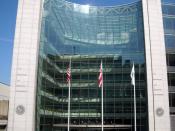Peter Valli
Professor Morris
Term Paper
5-7-2014
The Sarbanes-Oxley Act of 2002
Introduction
Many of us were not too young to remember some of the large corporate and accounting scandals that took place in the early 2000's. The scandals involving very large corporations such as Enron and WorldCom really shook up the marketplace. Not only did these scandals result in investors losing millions upon millions of dollars, but it really diminished everybody's confidence in the securities markets. Realizing that change had to be made and looking to restore the nation's confidence in the markets, Democratic Senator Paul Sarbanes of Maryland and Republican Representative Michael Oxley of Ohio purposed a new bill to the floor. This bill sought to increase the rules and regulations regarding auditing standards and accountability of corporations. The bill was called "The Sarbanes-Oxley Act of 2002", also known as the "Corporate and Auditing Accountability and Responsibility Act".
This paper will discuss in depth what aided in the creation of the Sarbanes-Oxley Act of 2002, what the law protects, important sections of the bill, and what some of the positive and negative effects of the bill are.
Before Sarbanes-Oxley
Before the Sarbanes-Oxley Act was created, the Securities Act of 1933 was the major regulatory law. The Securities Act of 1933 has two basic objectives. It "requires that investors receive financial and other significant information concerning securities being offered for public sale, and it prohibits deceit, misrepresentations, and other fraud in the sale of securities" (federal securities laws, sec.gov). The SEC enforces the Securities Act by requiring corporations to register stock and securities they offer to the public. The registration forms contain financial statements and other disclosures to enable investors to make informed judgments in purchasing securities. The SEC requires that the information companies provide be accurate...


